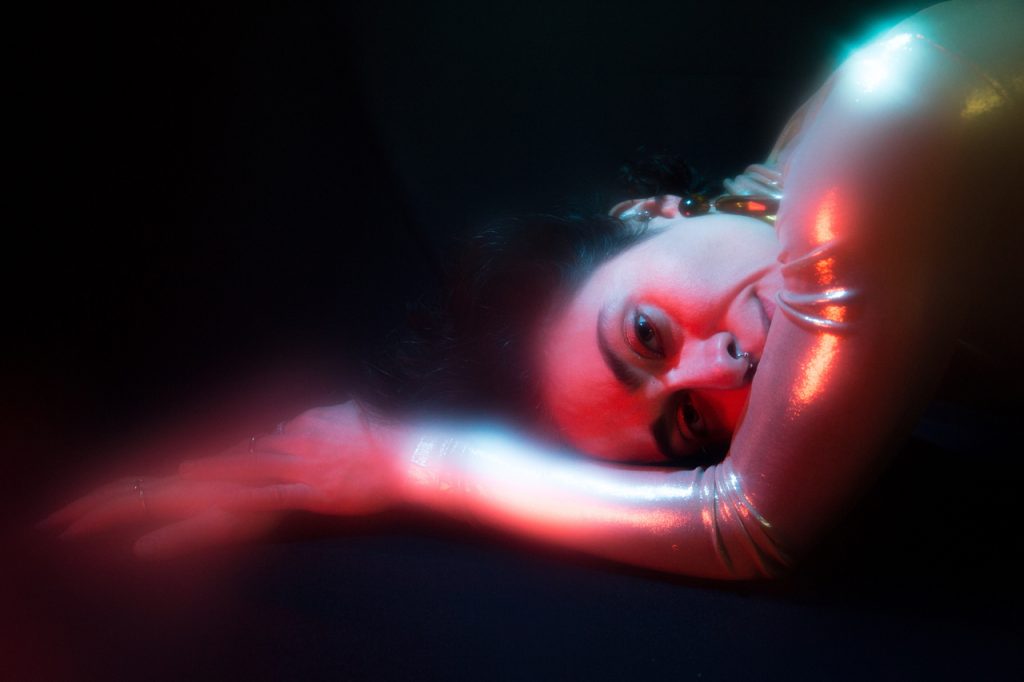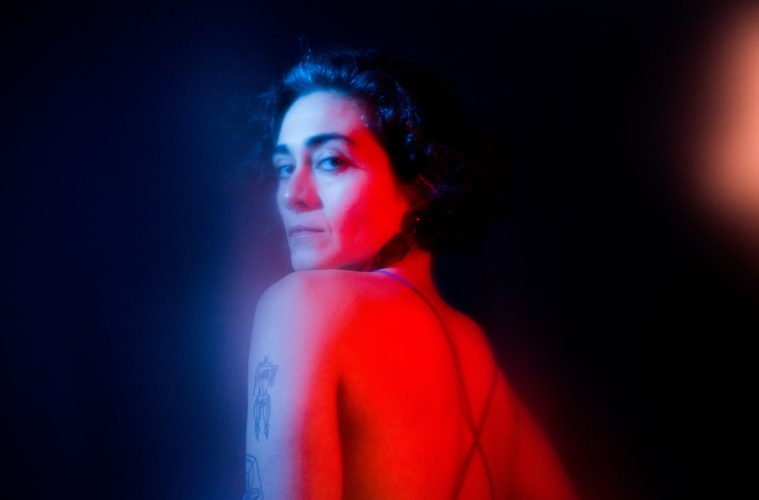Words and interview by Lizzy Vartanian Collieri
Photography by Teresa Suárez
This article is part of the “Emigration & Desolation” issue
Iranian gender-non-conforming artist Maral Bolouri lives and works in Paris. Though many in exile yearn to return home, Maral does not miss their country, a country that they equate with intolerance, a lack of respect for women and unsafe for the LGBTQ community. In fact, they felt most alienated during their childhood in Iran. Though Maral says they are disconnected from their birthplace, their work seems informed by it; much of their multidisciplinary work is a contemplative take on identity and lineage.
In Un-Mothering, they explore family history, female lineage and separation, questioning the patriarchal expectations of women as mothers. The series consists of found photos that are reminiscent of family archives lost during the Iranian Revolution, over which Maral wrote clusters of key phrases in Farsi, their mother tongue. In Tell me why you love me., Maral reflects on the ascendancy of identity-politics in the art world, and the pressure artists from marginalized backgrounds face to present themselves in terms of their identity, history, gender and political status. Similar themes are echoed in their ongoing series, Destiny, which addresses questions of social norms, assumptions often made about one’s background, and issues of freedom of speech, human rights and gender. The series pairs portraits of people and Persian carpets with a different phrase on their forehead in Farsi which reflects their struggle.
We spoke to Maral in a back-and-forth between London and Paris. The conversation on themes of philosophy, immigration, exile, and identity politics seemed fitting for two people living in cosmopolitan spaces with roots elsewhere. Maral tells us what it’s like to not miss their country, navigating the expectation put on her as a marginalised artist to narrate their existence and how they are investigating their own identity, allowing the viewer to rethink how they interpret art without subscribing to unconscious biases.
“Artists of marginalized backgrounds are expected to narrate and reproduce themselves in terms of their genders, identities, pasts, political status and worthiness.”

You were born in Iran, lived in Kenya and are now based in Paris. How has this experience of immigrating impacted on your work?
I think the experience of migration has introduced a broader range of questions to my practice. Living in Kenya, for example, has brought colonial and post-colonial realities into my work, and enriched my professional and personal life.
What does being in exile feel like or mean to you, knowing that you will never go back to where you were born?
Well, I think any kind of restriction changes us. It makes us feel confined because it compromises our freedom. However, I do not miss being in my country. This is a country of no tolerance for the LGBTQ community. It is a country with no respect for women. It is, in fact, my life in Iran (and especially my childhood) that felt like exile to me. The only thing I miss is seeing my family, but I fear that day when I have to mourn my loved ones from afar.
I often hear the Iranian community in diaspora romanticizing life in Iran. They claim one’s experience is more honest or genuine in Iran and that the Western way of life is sad and lonely, trying to prove Iran is much more than what the media reflects. I think that is actually a colonial point of view. In French they say we should “call a cat a cat”! Why do we need to save a culture or a people from its own atrocities? The violence that goes on in Iran on a daily basis is unfathomable. So, I do not feel nostalgic about Iran. I think it is ok not to like one’s homeland. What does it mean to be born in a certain country anyway?
In your artist’s statement, you say that you have never understood your political existence as an Iranian woman. Is that something you have tried to analyse?
When I say that, I am referencing Paul B. Preciado. In his book, An apartment on Uranus, he says he does not recognize his existence as part of the Spanish State, and then explains how he is a fugitive of the system.
This term resonates deeply with me and reflects my political situation. As a gender-non-conforming person who was born a Muslim woman in Iran, where there is no negotiation about gender, faith, or one’s basic rights as a citizen, what remains of one’s integrity? Fighting an ideological war was not something I would want to get involved with, at least not in Iran. The only solution was to leave. Just like Preciado, I too feel like a fugitive, alienated from where I come from and what it supposedly represents.
“I think it is ok not to like one’s homeland. What does it mean to be born in a certain country anyway?”

Building on that, is Un-mothering perhaps an attempt to understand your lineage?
Yes, it absolutely is. With Un-mothering I explore family history, female lineage and separation. The project questions the intense patriarchal expectations that women face as mothers and nurtures, and how it influences their rights to their own bodies and desires.
Within this context, I aim to reimagine and reconstruct a family archive aimed at healing, in commemoration and recognition of the living female bodies and the female bodies that came before me.
Un-mothering is my main project at the moment. Inspired by the French philosopher Anne Dufourmantelle’s work and by my own psychotherapy (focused on the mother-child relationship), I use found photos that are reminiscent of my family archive lost during the Iranian revolution and the following war. I draw on family narratives, and the vernacular language that emerges through talk therapy to explore notions of female lineage, belonging and separation.
My relationship with my own mother did impact or kickstart the project. Maybe that is why I was so moved by Dufourmantelle’s La Sauvagerie maternelle (maternal savagery).
The art world seems to be preoccupied with identity politics right now, especially for those working in places that are different from where they were born. Do you feel a pressure to acknowledge and confront your roots within your work?
Artists of marginalized backgrounds are expected to narrate and reproduce themselves in terms of their genders, identities, pasts, political status and worthiness. So, I am interested in asking: What prejudices are sustained when art is judged based on the identity of the artist? How would we see art differently if we began by accepting the artist as a subject whose identity is not presumed?
I address this issue in the project Tell me why you love me., which is inspired by works of Slavoj Zizek. This work reflects my effort to break up the ideological constellation that determines my “symbolic identity” and asks that I obey my masters but act as if I were free and equal. At its core, the work showcases my demand for “equal rights to evil” – the right to be ungrateful, rootless, genderless, bodiless, and inconvenient.
Because I was othered, I am also in the stories of those who have been othered too. For the Destiny series, I mainly documented the stories of individuals who have been marginalized, criticized or frowned upon based on their practice, gender or background. I think it is important to get these stories heard.

Your work seems (to me), to be highly contemplative, what are you trying to figure out through your art?
That is the million-dollar question, isn’t it? My work has evolved slowly into a research-based practice which is predominantly inspired by what I read. At the moment, I am interested in the work of philosophers such as Anne Dufourmantelle, Slavoj Zizek, and Paul B. Preciado.
Reading helps me clarify and organize my ideas, and is an important part of the creative process. It facilitates the imagination and realization of each artistic project.
So, as you navigate your identity and place in the world, what does home mean to you and what is home to you now?
I was very homesick when I left Nairobi. To this day, most of my artworks and books are still in Nairobi. I wonder why I was so attached to this city, considering that I now call Paris home. I think what makes Nairobi or Paris home to me is the network of brilliant and kind souls that have made my life richer and more meaningful.
Maral navigates the idea of “belonging” throughout their work. Though removed from their native Iran, their work keeps referencing it through the introduction of text, family archives and an exploration of their lineage. Settled in Paris, they orient themselves to working with others who – like them – has their identity reduced to their birthplace. Through philosophical enquiries, Maral juxtaposes alienation with exile, asking what is home, and where do they belong.

